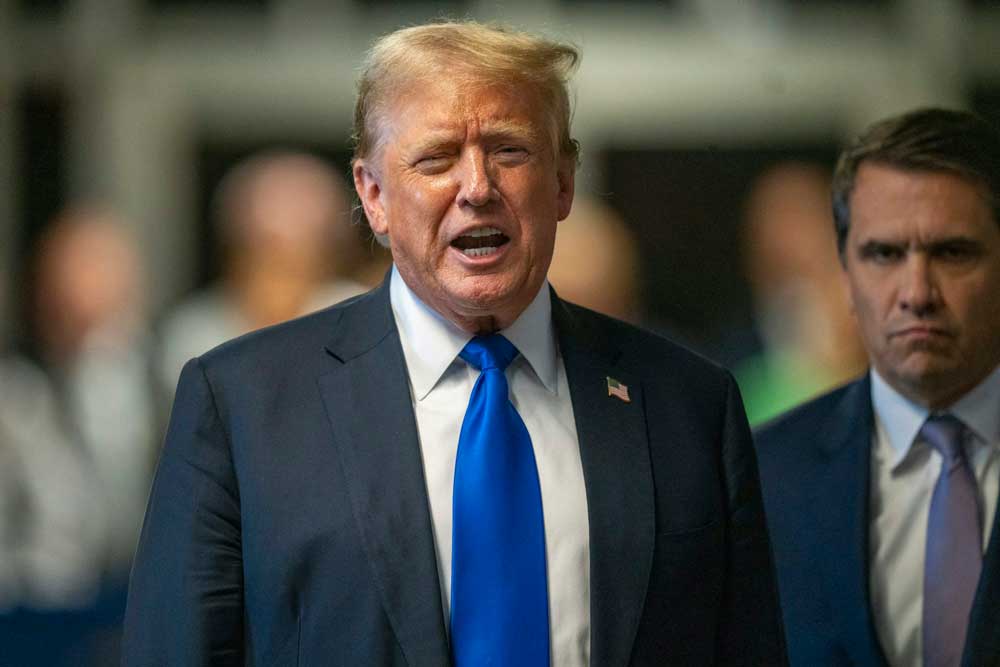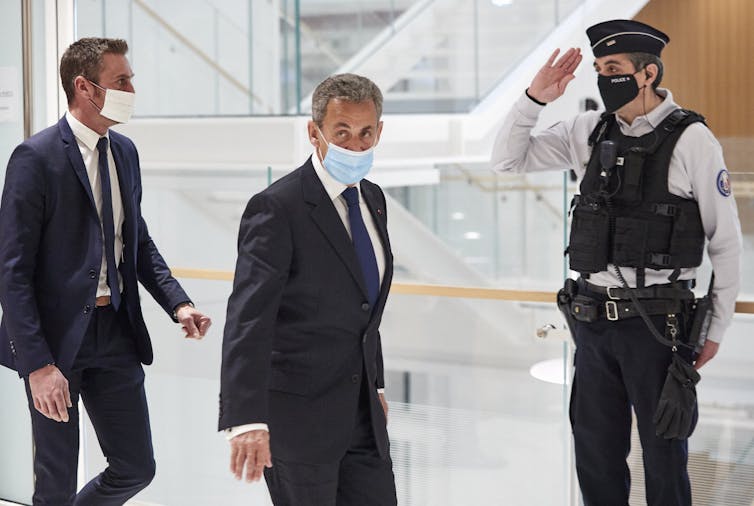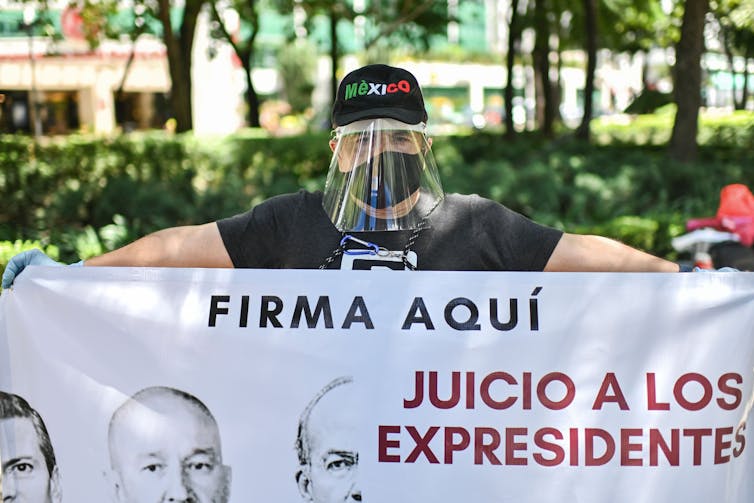
By James D. Long, Morgan Wack and Victor Menaldo
A Manhattan jury on May 30, 2024 convicted former President Donald Trump on charges he falsified business records related to the cover-up of his relationship with a porn star.
While this trial is now over, Trump still faces three other prosecutions: the state case against Trump and 18 others on charges they attempted to subvert the 2020 election in Georgia; the federal prosecution that charges Trump with conspiring to overturn the 2020 election; and a second federal prosecution on charges Trump illegally kept classified documents at Mar-a-Lago after his presidency ended and obstructed efforts to retrieve those documents.
While charging a former president with criminal offenses was a first in the United States with Trump, in other countries ex-leaders are routinely investigated, prosecuted and even jailed.
In March 2021, former French President Nicolas Sarkozy was sentenced to a year in prison for corruption and influence peddling. Later that year, a trial commenced of Israel’s longtime Prime Minister Benjamin Netanyahu related to breaches of trust, bribery and fraud; it is ongoing. And Jacob Zuma, the former president of South Africa who was charged with money laundering and racketeering, likely faces trial in 2025 after years of delay.
At first glance, prosecuting current or past top officials accused of illegal conduct seems like an obvious decision for a democracy: Everyone should be subject to the rule of law.
But presidents and prime ministers aren’t just anyone. They are chosen by a nation’s citizens or their parties to lead. They are often popular, sometimes revered. So judicial proceedings against them are inevitably perceived as political and become divisive.
Destabilizing prosecutions
This is partly why U.S. President Gerald Ford pardoned Richard Nixon, his predecessor, in 1974. Despite clear evidence of criminal wrongdoing in the Watergate scandal, Ford feared the country “would needlessly be diverted from meeting (our) challenges if we as a people were to remain sharply divided over” punishing the ex-president.
Public reaction at the time was divided along party lines. Today, some now see absolving Nixon as necessary to heal the nation, while others believe it was a historic mistake, even taking Nixon’s deteriorating health into account – if for no other reason than it emboldens future impunity of the kind Trump is accused of.
Our research on prosecuting world leaders finds that both sweeping immunity and overzealous prosecutions can undermine democracy. But such prosecutions pose different risks for older democracies such as France and the U.S. than they do in younger democracies like South Africa.
Mature democracies
Strong democracies are usually competent enough – and the judicial system independent enough – to prosecute politicians who misbehave, including top leaders.
Sarkozy is France’s second modern president to be found guilty of corruption, after Jacques Chirac in 2011 for kickbacks and an attempt to bribe a magistrate. The country didn’t fall apart after either conviction, and Sarkozy now faces additional charges related to alleged illegal campaign financing from Libya.

Kiran Ridley/Getty Images
In mature democracies, prosecutions that hold leaders accountable can solidify the rule of law. South Korea investigated and convicted five former presidents starting in the 1990s, a wave of political prosecutions that culminated in the 2018 impeachment of President Park Geun-hye and, soon after, the conviction and imprisonment of her predecessor, Lee Myung-bak.
Did these prosecutions deter future leaders from wrongdoing? For what it’s worth, Korea’s two most recent presidents have so far kept out of legal trouble.
Overzealous prosecution versus rule of law
Even in mature democracies, prosecutors or judges can abuse prosecutions. But overzealous political prosecution is more likely, and potentially more damaging, in emerging democracies where courts and other public institutions may be insufficiently independent from politics. The weaker and more beholden the judiciary, the easier it is for leaders to exploit the system, either to expand their own power or to take down an opponent.
Brazil embodies this dilemma.
Ex-President Luiz Inácio “Lula” da Silva, a former shoeshine boy turned popular leftist, was jailed in 2018 for accepting bribes. Many Brazilians thought his prosecution was a politicized effort to end his career, but Lula was elected in October, 2022.
A year later, the same prosecutorial team accused the conservative former President Michel Temer of accepting millions in bribes. After his term ended in 2019, Temer was arrested; his trial was later suspended.
Both Brazilian presidents’ prosecutions were part of a yearslong, sweeping anti-corruption probe by the courts that has jailed dozens of politicians. Even the probe’s lead prosecutor is accused of corruption.
Depending on the perspective, Brazil’s crisis reveals that nobody is above the law or that the government is incorrigibly corrupt – or both. With such confusion, it becomes easier for politicians and voters to view leaders’ transgressions as a normal cost of doing business.
For Lula, a conviction didn’t end his career. He was released from jail in 2019 and the Supreme Court later annulled his conviction. Lula won the 2022 presidential race against Jair Bolsonaro, with Bolsonaro now indicted related to fraud in his dealing with the pandemic.
Stability versus accountability
Historically, Mexico has taken a different approach to prosecuting past presidents: It doesn’t.
During the 20th century, Mexico’s ruling Institutional Revolutionary Party, or PRI, established a system of patronage and corruption that kept its members in power and other parties in the minority. While making a show of going after smaller fish for petty indiscretions, the PRI-run legal system wouldn’t touch top party officials, even the most openly corrupt.
Impunity kept Mexico stable during its transition to democracy in the 1990s by placating PRI members’ fears of prosecution after leaving office. But government corruption flourished, and with it, organized crime.
That may be changing, though. In early August 2022, Mexican federal prosecutors confirmed that it had several open investigations into former PRI President Enrique Peña Nieto for alleged money laundering and election-related offenses, among other crimes, which appear to remain active.

Pedro Pardo/AFP via Getty Images
Mexico is far from the only country to overlook the bad deeds of past leaders. Our research finds that only 23% of countries that transitioned to democracy between 1885 and 2004 charged former leaders with crimes after democratization.
Protecting authoritarians – including those who oversaw human rights violations – may seem contrary to democratic values, but many transitional governments have decided it is necessary for democracy to take root.
That’s the bargain South Africa struck as apartheid’s decades of segregation and human rights abuses ended in the early 1990s. South Africa’s white-dominated government negotiated with Nelson Mandela’s Black-led African National Congress to ensure outgoing government members and supporters would avoid prosecution and largely retain their wealth.
This strategy helped the country transition to majority Black rule in 1994 and avoid a civil war. But it hurt efforts to create a more equal South Africa. As a result, the country has retained one of the world’s highest racial wealth gaps.
Corruption is a problem, too, as former President Zuma’s prosecution for lavish personal use of public funds shows. But South Africa has a famously independent judiciary. Despite delays and appeals, Zuma’s prosecution continues, and he was prevented from contesting the presidency this year.
How mature is mature?
Israel is partly a testament to the rule of law – and partly a cautionary tale about prosecuting leaders in democracies.
Israel didn’t wait for Netanyahu to leave office to investigate wrongdoing. But several court processes were fraught with delays, in part because Netanyahu used state power to resist what he called a “witch hunt.”
Netanyahu tried unsuccessfully to secure immunity and stall while his Likud party cried foul. He was even reelected while under indictment. In December 2023, judges limited the number of trial days per week because of the war in Gaza, but the cases are ongoing.
With Trump’s Manhattan jury verdict, the process has revealed something fundamental about American democracy. As its repercussions play out, the verdict will likely be seen as both a matter of law – and politics.
![]()
James D. Long is Professor of Political Science and Co-founder of the Political Economy Forum at the University of Washington. Morgan Wack is Assistant Research Professor of Political Science in the Media Forensics Hub at Clemson University. Victor Menaldo is Professor of Political Science and Co-founder of the Political Economy Forum at the University of Washington. This is a substantially updated version of an article originally published on March 16, 2021.





























c says
One of my Favourites :)
=====================
From Terry Pratchett’s Discworld Novel – The Last Continent –
“Some chief went to prison to see the prime minister and the PM said, ‘Mate, your mob can dig it all up and drop it over the edge of the world, no worries.’”
“Why did he have to go to prison?”
“We put all our politicians in prison as soon as they’re elected. Don’t you?”
“Why?”
“It saves time.”
========================
Shelly says
There goes democracy out the window, we are officially a 3rd world country thanks to the Biden/Obama/ Harris administration. Communism is next
c says
I was going to try to reply, then I realized that any rational response would be already pre-judged and pre-ignored – even prior to making one -so .. the only proper response to trolls comment’s like this is:
“To argue with a person who has renounced the use of reason is like administering medicine to the dead.”
Thomas Paine
“I learned long ago, never to wrestle with a pig. You get dirty, and besides, the pig likes it”.
George Bernard Shaw
Of course, both Paine and Shaw were heavily weaponized by the Obama administration as ‘ALL OF US IN AMERICA’ already know … lolol.
This crap would be funny – If I could watch it from Mars
Sherry says
@shelly. . . Quite the opposite is true! We are still a country of law and order. A civilian “jury” of 12 US Citizens has rendered their verdict of criminally “Guilty” of a Felony.
Unless you are so far gone that you imagine the entire judicial system in every state is rigged by some kind of political power cabal, just how could President Biden reach into the minds of those jurors?
Please, for the sake of your own sanity, unplug and take your reasoning power back.
Nephew Of Uncle Sam says
HUH!? Your statement makes absolutely no sense Shelly, unless of course the Kool-Aid you drink fogs the lenses. What did any of the three individuals you name have anything to do with your messiahs 91 indictments and sexual assault conviction? Seems he brought it all on himself with #45 getting 34 counts of guilty by the State of New York.
Laurel says
Dear Shelly: Yesterday, the stock market closed up 574.84 points. Please tell me what “3rd world country” does that, and how that leads to “communism”?
Y’all really, really need to stop watching Fox. The spin there is dizzying!
I’m gonna tell y’all something else. We just got back from a resort in south Florida, and if we’re in a “3rd world” country, or taking away young people’s future by pulling up the ladder behind us, you would never know it there! There were a lot, I mean a lot, of young people, with their kids, after the holiday, coming and going, renting $250 dollar a day (and way up) cabanas, buying food and drinks, and using the spa. Not very many seniors there, almost all were 40 and under. Didn’t look at all like communism was on its way. We passed on the $79-$210 steaks, with the sides a la carte. Went out instead. Busy there too.
Pogo says
@This time
…an unknown ghostwriter will (strike, it’s probably already in its 2nd printing in warehouses in Moscow, Beijing, and Naples, FL) produce Mein Kampf, 2.0, with Trump’s name on it — without Trump having spent a second in jail. Trump has been on the book tour since the year 2000.
https://en.wikipedia.org/wiki/Donald_Trump_presidential_campaign
Laurel says
Meanwhile, what I see is, a black, autistic kid assigned to an untrained teacher, then beat up a para teacher’s assistant, who was previously the lunch lady who shouldn’t have had access, sat in jail for a couple months waiting for trial. Poor, unfairly treated Trump was free until trial, and when convicted of 34 felonies, walked out! Right out the damned front door to waiting cameras where he could cry, cry, cry.
So much for fairness.
Trump should have been handcuffed right then and there, and walked his ass strait to jail. Poor, frozen snowflake baby. I bet the NFL and Taylor Swift were the jurors.